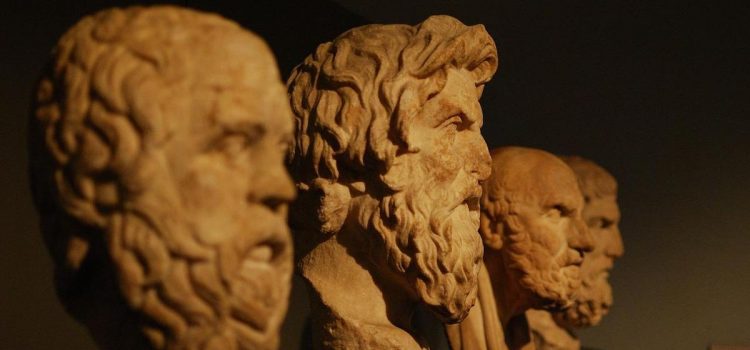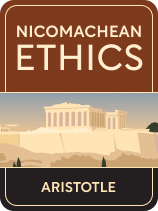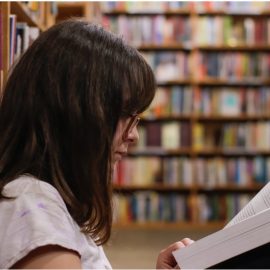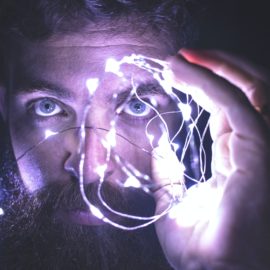

This article is an excerpt from the Shortform book guide to "Nicomachean Ethics" by Aristotle. Shortform has the world's best summaries and analyses of books you should be reading.
Like this article? Sign up for a free trial here .
How can people become virtuous? What was Aristotle’s theory?
A person can develop moral virtue, Aristotle says, through habit. This journey involves three main elements: achieving a mean between two vices, experiencing pain and pleasure, and acquiring moral education.
Continue reading for an overview of Aristotle’s ideas about moral virtue as presented in his Nicomachean Ethics.
Developing Moral Virtue
Developing moral virtue, Aristotle argues, involves three main components. Let’s take a look at each one.
Virtue as a Mean Between Two Vices
People become virtuous by developing specific virtues through habitual action—a person becomes courageous by doing courageous things, for example. However, Aristotle suggests that these virtues can only exist as a happy medium, or “mean.” An overdeveloped or underdeveloped quality isn’t virtuous at all, but rather a vice. For example, someone who has overdeveloped courage is reckless, while someone with underdeveloped courage is cowardly. Therefore, becoming virtuous requires proper development of individual virtues, practicing them in the right amount so they aren’t overdeveloped or underdeveloped.
(Shortform note: Critics of Aristotle argue that not every ethical decision can be measured in terms of “too much” or “too little” of a certain virtue. For example, morally virtuous Frank is on a jury and has to determine if a criminal is guilty or not. In this instance, Frank has to choose one option or the other—he’s not deciding “how much” of a virtue is appropriate for the situation. Defenders of Aristotle argue that every decision does involve finding a mean—it just sometimes requires a broader view of an ethical situation. For example, Frank might have to decide the right amount of generosity toward the accused who’s lived a hard life, or he might have to decide the right amount of courage if he has to go against the other jurors.)
Pleasure and Pain
Becoming virtuous also involves “training” a person to develop a clear sense of what’s emotionally pleasant or painful—what they like and dislike. This is because moral virtues deal exclusively with matters of pleasure and pain. These emotions are the lens through which people understand actions and their consequences: For example, random acts of violence are immoral because they cause pain for no reason.
To become morally virtuous, a person must learn to take pleasure in virtuous things and to feel pain at vice or wrongdoing. This process aligns the rational and emotional parts of themselves: The rational part knows virtuous things are good, and the emotional part enjoys and desires virtuous things because it’s been conditioned to take pleasure in them. Therefore, a morally virtuous person doesn’t do virtuous things because of unemotional deliberation—they do virtuous things because it feels good and because they hate what’s immoral.
For example, morally virtuous Frank learns that his landlord is scamming his neighbor Linda. Rationally, he knows that scamming is immoral and that stopping his landlord is the morally virtuous thing to do. Emotionally, he’s mad that the landlord is scamming Linda and desires a just outcome. Frank’s rational response tells him what he should do, and his emotional response inspires him to do it.
(Shortform note: Much like Aristotle, the ancient Greek philosopher Epicurus suggests that living a morally virtuous life is pleasurable. However, while Aristotle says pleasure is just a means to the end of living a morally virtuous life, Epicurus argues the opposite—a virtuous life is just a means to the end of feeling pleasure. He claims that moral virtue leads to stable and consistent pleasure, while impulsively fulfilling desires offers temporary pleasures and future pains. For example, a temperate person takes pleasure in a glass of wine, then stops drinking and feels satisfied with their restraint. An indulgent person feels pleasure when they drink two bottles of wine, then makes bad decisions (leading to future pains) and feels horrible the next morning.)
Moral Education
Aristotle suggests that, to develop the necessary habits and “training” for virtue, a person needs education from a virtuous teacher starting from childhood. This education begins with imitation: Instead of asking, “What is the virtuous thing to do in this situation?” a student asks, “What would my teacher do in this situation?” A teacher will also recognize the proper “mean” unique to their student: For example, a brave but impulsive student needs to spend more time on moderate actions than courageous actions.
(Shortform note: Some scholars note that Aristotle’s ethics (and other similar systems of “virtue ethics”) is one of the only ethical systems that encourages asking for help. To Aristotle, consulting a morally virtuous person for advice is crucial for developing moral virtue yourself. Other ethical systems like utilitarianism or Kantianism don’t mention the idea of asking for help or guidance from a moral person. Instead, these systems only focus on providing rules that apply to every possible ethical dilemma. Scholars suggest that because of this, Aristotle is one of the few philosophers who accounts for a major factor in real-life ethical decision-making: asking people you respect what they would do in your situation.)

———End of Preview———
Like what you just read? Read the rest of the world's best book summary and analysis of Aristotle's "Nicomachean Ethics" at Shortform .
Here's what you'll find in our full Nicomachean Ethics summary :
- Aristotle's philosophies on topics such as happiness, virtue, and wisdom
- What it means to be morally virtuous and how someone can develop moral virtue
- How wisdom contributes to the possibility of a happy life






